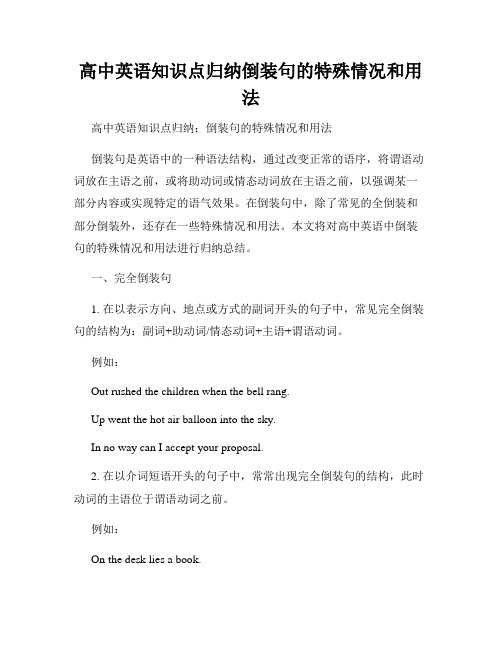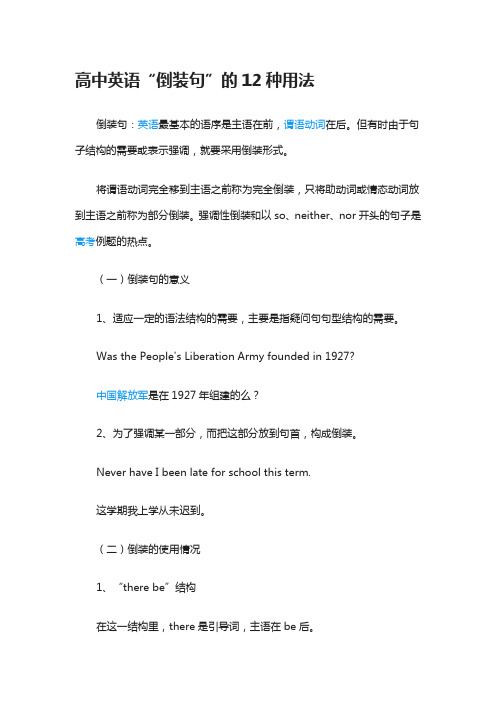倒装句用法归纳高二
高中英语语法倒装句总结讲解

高中英语语法倒装句总结讲解1. 完全倒装:即将谓语动词的全部置于主语之前。
常见用法:1) 当here, there, in, ou t, up, down, on 等副词置于句首,且主语为名词时;2) 将表示地点、方位的介词短语置于句首;3) 直接引语置于句首,其后的主语是名词时。
2. 部分倒装:即将谓语动词的一部分置于主语之前(如助动词be, do, have, will,和情态动词may, can, must, should 等)。
常见用法:1) 否定词或词组,如neither, nor, never, nowhere, not, seldom, rarely, scarcely, barely, hardly, no sooner, at no time, in no case, in no way, by no means, on no condition 等置于句首时;2) so 表示“也”,neither/ nor表示“也不”;so / such… that 表示“那样……以至于”置于句首时;3) only + 状语/ 状从,置于句首时, 主句要部分倒装;注意:当only + 主语置于句首时,则用正常语序。
4) not only … but also…引导两个分句时,not only 引导的分句要部分倒装;5) not until + 状语/ 状从,“直到……才”,置于句首时,主句要部分倒装;6) adj. / adv. / n. / v. / 分词+ as / though + 主语+ 谓语:引导让步状从,置于句首时;7) 在虚拟语气的条件句中,如含should, had, were, 可将它们置于句首,且省略if;8) 用于:May + 主语+ v. 结构中,表示“祝愿”;9) 表示次数、频率的副词置于句首时(也可用正常语序)。
倒装句口诀:副词开头要例装,人称代词则如常。
only修饰副介状,位于句首半倒装。
高中英语知识点归纳倒装句的特殊情况和用法

高中英语知识点归纳倒装句的特殊情况和用法高中英语知识点归纳:倒装句的特殊情况和用法倒装句是英语中的一种语法结构,通过改变正常的语序,将谓语动词放在主语之前,或将助动词或情态动词放在主语之前,以强调某一部分内容或实现特定的语气效果。
在倒装句中,除了常见的全倒装和部分倒装外,还存在一些特殊情况和用法。
本文将对高中英语中倒装句的特殊情况和用法进行归纳总结。
一、完全倒装句1. 在以表示方向、地点或方式的副词开头的句子中,常见完全倒装句的结构为:副词+助动词/情态动词+主语+谓语动词。
例如:Out rushed the children when the bell rang.Up went the hot air balloon into the sky.In no way can I accept your proposal.2. 在以介词短语开头的句子中,常常出现完全倒装句的结构,此时动词的主语位于谓语动词之前。
例如:On the desk lies a book.Under the bridge flows a river.二、强调句型倒装句常用于强调句型,通过改变正常语序,将被强调的部分提前至句首,以突出重要信息。
1. It is/was + 被强调部分 + that/who + 句子其余部分。
用于强调句子的主语、宾语、地点、时间等。
例如:It is Jane who won the singing competition.It was at the park where they met for the first time.It was yesterday that I finished reading the book.2. What/How + be 动词 + 主语 + 谓语动词 + 其他成分。
用于强调句子的母语、宾语、状语等。
例如:What I want is a peaceful world.How beautiful the sunset is!How hard he works!三、倒装句用于祝愿句和条件句1. May/Should + 主语 + 谓语动词.May you have a wonderful journey!Should you need any assistance, feel free to contact us.2. If + should/ were + 主语 + 谓语动词.If it should rain tomorrow, we will cancel the outdoor activity.If I were you, I would apologize to him.四、疑问句的倒装在一般疑问句中,主语和助动词/情态动词倒装。
高中英语倒装句的归纳总结

高中英语倒装句的归纳总结倒装句是英语中的一种特殊语法结构,通常在句子中,主语和谓语动词的位置是固定的,即主语在前,谓语动词在后。
然而,在某些情况下,为了强调句子中的某个成分,或者为了满足特定的语法要求,我们需要将主语和谓语动词的位置颠倒,这就是倒装句。
倒装句在高中英语中经常出现,因此对其进行归纳总结具有重要的意义。
一、全部倒装全部倒装是指句子中的主语和谓语动词完全颠倒的情况,常见于以下几种情况:1. 在以副词here, there或者out, in等表示地点的副词开始的句子中,常常采用全部倒装。
Here comes the bus.(汽车来了。
)There goes the bell.(铃声响了。
)Out rushed the children.(孩子们冲了出去。
)2. 在以表示方向的副词和介词短语开头的句子中,常采用全部倒装。
Down went the sun.(太阳下山了。
)In came the teacher.(老师进来了。
)3. 在以表示否定意义的副词或副词短语开头的句子中,常采用全部倒装。
Never have I seen such a beautiful view.(我从未见过如此美景。
)Not only does he play basketball, but he also plays football.(他不仅打篮球,还踢足球。
)二、部分倒装部分倒装是指只将谓语动词和助动词或情态动词提到主语之前,而将其他成分保持原来顺序的情况。
常见的部分倒装有以下几种情况:1. 在以表示否定意义的副词或副词短语位于句首时,动词与主语之间采用部分倒装。
Never have I been to Paris.(我从未去过巴黎。
)Hardly had she finished her speech when they clapped.(她刚刚讲完演讲就被他们鼓掌了。
)2. 在以so和neither引导的倒装句中,动词与主语之间采用部分倒装。
高中英语知识点归纳倒装句的结构和应用

高中英语知识点归纳倒装句的结构和应用高中英语知识点归纳:倒装句的结构和应用倒装句是英语语法中一个常见而重要的句式。
它的结构和应用在高中英语学习中扮演着重要的角色。
本文将从基本结构入手,通过归纳总结,讨论倒装句的不同类型、用法以及注意事项。
一、基本结构倒装句是将助动词、情态动词或者谓语动词的部分提到主语之前的一种特殊的句子结构。
主要包括完全倒装和部分倒装两种形式。
1. 完全倒装完全倒装指的是将整个谓语放在主语之前,形式上改变了正常语序,常见的结构有:a) 在一般现在时和一般过去时中的助动词倒装:Never have I seen such a beautiful sunset.(我从未看过如此美丽的日落。
)Not until yesterday did he realize his mistake.(直到昨天他才意识到自己的错误。
)b) 在情态动词后的倒装:Can you swim?(你会游泳吗?)Should you need any further assistance, please do not hesitate to contact us.(如果您需要进一步的帮助,请随时联系我们。
)2. 部分倒装部分倒装是将谓语的助动词、情态动词或者be动词及其主语中的一部分提到句首,形成倒装句。
这种结构较为灵活,可以用于各种句子类型中。
a) 含有否定意义的副词或词组引导的倒装:Never have I been so embarrassed.(我从未感到如此尴尬。
)Under no circumstances should you reveal your password.(在任何情况下你都不应该透露密码。
)b) 含有“only”引导的倒装:Only in this way can we solve the problem effectively.(只有这样我们才能有效地解决问题。
)Only when he left did she realize how much she loved him.(只有在他离开之后她才意识到自己有多爱他。
高中英语知识点归纳倒装句的用法总结

高中英语知识点归纳倒装句的用法总结高中英语知识点归纳:倒装句的用法总结倒装句是英语语法中的一种特殊语法结构,常见于各种语言形式中。
倒装句通常在句子中,把谓语动词放在主语之前,从而改变了正常语序。
在英语学习中,倒装句是一个重要的知识点,掌握了它的基本用法,可以使我们的表达更加地准确、得体。
本文将对高中英语学习中与倒装句有关的知识进行归纳和总结,以便同学们更好地掌握和运用。
一、完全倒装句完全倒装句是指把整个谓语动词放在主语之前,常用于以下几种情况:1.以副词或介词词组开头的句子:- Never have I seen such a beautiful sunset. 我从未见过如此美丽的日落。
- In front of us stood a tall building. 在我们面前矗立着一座高楼。
2.以表示否定意义的副词开头的句子:- Not only did she forget my birthday, but she also didn't apologize. 她不仅忘记了我的生日,而且也没有道歉。
3.以表示“只有、仅仅、唯一”等意义的副词或词组开头的句子:- Only by working hard can you achieve your goals. 只有通过努力工作,你才能实现自己的目标。
4.以表地点的副词或介词短语放在句首,句子的主语为there时:- There is a cat under the table. 桌子下有一只猫。
- Here comes the train. 火车来了。
二、部分倒装句部分倒装句是指把助动词放在主语之前,常用于以下几种情况:1.以表示否定的词或短语开头的句子,包括never、not、seldom、hardly等:- Never have I seen such a talented musician. 我从未见过如此有天赋的音乐家。
2.以表示“只有、仅仅、唯一”等意义的副词或词组开头的句子,包括only、hardly等:- Only when the sun sets can we see the stars in the sky. 只有太阳下山后,我们才能看到天空中的星星。
高二英语语法大全倒装句讲解

1.倒装句的定义:英语最基本的词序是主语在谓语动词的前面。
如果把谓语动词放在主语前面,就叫做倒装。
2. 倒装句的构成a) 完全倒装将句子的主语和谓语完全颠倒过来,称之为完全倒装。
Are you from here? 你是本地人吗?Now comes the chance. 机会来了。
b) 部分倒装只将助动词、系动词或情态动词移至主语之前,谓语的其他部分仍保留在主语的后面,称之为部分倒装。
例如:Has he come? 他来了吗?Seldom have we felt as comfortable as here. 我们难得像在这里这么舒服。
Only in this way can we do the work better.3. 倒装的原因a) 句子语法结构的需要。
例如:Did you attend the meeting? 你参加会议了吗?Long live peace! 和平万岁!b) 一些句型的固定用法。
例如:Such were his last words. 他最后的话就是这样。
c)强调的需要。
倒装以后,句子更加流畅生动。
例如:Never before have we seen such a sight. 以前我们从来没有见过这样的情景。
Before us lay a lot of difficulties. 在我们前面有很多困难。
Often did we warn them not to do so. 我们曾多次警告他们不要这样做。
4. 倒装句的基本用法a) 构成疑问句(除对主语或主语之定语提问的特殊疑问句外):When are we going to drink to your happiness? 我们什么时候喝你们的喜酒?Have you seen the film? 你看了那部电影吗?b) 在以here, there, now, then, in, away, up downc) 副词only+状语放在句首时:Only then did he realize his mistakes . 只有在那时他才认识到自己的错误。
(完整版)高中英语“倒装句”的12种用法

高中英语“倒装句”的12种用法倒装句:英语最基本的语序是主语在前,谓语动词在后。
但有时由于句子结构的需要或表示强调,就要采用倒装形式。
将谓语动词完全移到主语之前称为完全倒装,只将助动词或情态动词放到主语之前称为部分倒装。
强调性倒装和以so、neither、nor开头的句子是高考例题的热点。
(一)倒装句的意义1、适应一定的语法结构的需要,主要是指疑问句句型结构的需要。
Was the People's Liberation Army founded in 1927?中国解放军是在1927年组建的么?2、为了强调某一部分,而把这部分放到句首,构成倒装。
Never have I been late for school this term.这学期我上学从未迟到。
(二)倒装的使用情况1、“there be”结构在这一结构里,there是引导词,主语在be后。
There is a box on the table.桌子上有个盒子。
2、疑问句疑问句为倒装形式。
Is she singing in the classroom?她是不是正在教室里唱歌?3、here、there等副词开头的句子(部分)在here、there等副词开头的某些句子中(要用一般现在时态)(前两个例句);如果主语是人称代词,主语和主要动词的词序不变。
(完全倒装)(最后一个例句)There goes the bell.铃响了。
Here is an apple for you.这个苹果给你。
There she comes.她来了。
4、重复倒装句型在以so、nor、neither开头,表示谓语所述的情况也适用于另一个人或一事物的肯定或否定句中。
so用于肯定句,表示“也一样”、“也这样”;nor、neither用于否定句,表示“同样也不,也不这样”。
I am watching TV. So is she.我在看电视,她也是。
My parents didn't watch TV last night. Neither (Nor) did I.我父母昨晚没有看电视,我也没看。
高中英语知识点归纳倒装句的用法

高中英语知识点归纳倒装句的用法倒装句是英语中的一种常见语法现象,它与一般的语序有所不同。
在倒装句中,谓语动词不再位于句子的中间,而是移到主语之前或状语之前,这种语法结构的运用可以使句子显得更加生动有趣。
下面将对高中英语中常见的倒装句进行归纳总结。
一、完全倒装句完全倒装句是指将助动词、情态动词或系动词放在主语之前,句子的谓语动词则位于主语之后。
完全倒装句的结构为:助动词/情态动词/系动词+主语+谓语动词+其他。
1.助动词完全倒装句助动词包括be动词、have动词和do动词。
当句子以副词here、there或表示方向的副词(如up、down、in、out等)开头时,为了突出地点或方向,可以采用助动词完全倒装的形式。
例如:Here comes the bus.There is a cat under the table.Down came the rain.2.情态动词完全倒装句情态动词包括can、could、may、might、must、shall、should、will、would等。
在表示祝愿、建议、命令等意义时,可以采用完全倒装的形式。
例如:May you have a happy birthday!Should you need any help, feel free to ask.Will you please close the door?3.系动词完全倒装句系动词包括be动词、seem、appear、look、sound等。
在表示位置、方式、状态、主语特征等方面时,可以采用系动词完全倒装的形式。
例如:On the table lies a book.How beautiful the flowers are!Tired as he was, he kept working.二、部分倒装句部分倒装句是指将谓语动词的一部分(通常是助动词或情态动词)与主语之间的位置对调,这种语法结构常见于否定句、选择疑问句和以感叹词开头的句子。
- 1、下载文档前请自行甄别文档内容的完整性,平台不提供额外的编辑、内容补充、找答案等附加服务。
- 2、"仅部分预览"的文档,不可在线预览部分如存在完整性等问题,可反馈申请退款(可完整预览的文档不适用该条件!)。
- 3、如文档侵犯您的权益,请联系客服反馈,我们会尽快为您处理(人工客服工作时间:9:00-18:30)。
倒装句用法归纳一.完全倒装定义:把谓语的全部放在主语之前。
完全倒装主要有以下两种情况。
here, there, out, in ,up, down, away, back, off, now, then(等副词一)在以++谓语开头的句子里,以示强调,要用完全倒装(其结构为:副词主语)。
the teacher. In came1.老师进来了。
男孩冲了出去。
Out2. the boy.rushedthe boy.went3. Down 男孩下来了。
★主语是人称代词时,主语和谓语的语序不变。
came.1. In herushed.2. Out shewent. 3. Down he(为了保持句子平衡,或为了强调表语或状语,或使上下文紧密衔接时(其结构二+/+谓语为:表语状语主语)。
a brown snake. was1. Around his neck 一条棕色的蛇缠绕着他的脖子。
an old sick goat. 2. On the ground lay一只生病的山羊躺在地上。
][与高考连接1. On the wall _______ two large portraits. (MET 85A. hangsB. hangC. hangedD. hanging2. Be quick! _______. (MET 86A. The bus comes hereB. The bus here comesC. Here the bus comesD.Here comes the busKey: 1. B 2. D. 二部分倒装: 定义把助动词、情态动词或系动词放在主语之前。
部分倒装主要有以下八种情况。
so(一)放在句首,表示前面所说的情况也适用于另一个人或把副词物,其句型为:+so+助/情/系另一主语1. He is a ball fan. So am I.2. I have finished my paper. So has he.3. If he can do it, so canI.neither/nor( 放在句首,表示前面否定的内容也适用于另一个人或物,其句把二型为:+neither/nor+另一主语助/情/系Neither/Nor has my sister.1. I have never been to Beijing. 2. Li Wei can't answer the question. Neither/Nor can I. 3. He isn't willing to go, and neither/nor am I. only(三所修饰的副词、介词短语或状语从句放在句首时I realize the importance of English. 1. did直到那时我才意识到学英Only then.语的重要性can we work it out..2. Only by this means只有通过这种方式我们才能解决它3. will I believe it.只有当我亲眼看见Only when I have seen it with my own eyes.的时候我才相信only,不倒装修饰主语时★Only Wang Lin can answer my question..只有王林能够回答我的问题( 含有否定意义的副词、连词或介词短语放在句首时四hardly, never, not, seldom, nowhere, little, not until, not only…but also, 如:neither…nor…,no sooner …than…,hardly…when, at no time, by no means,in no time, in no way…A. 含有否定意义的副词1. Never shall I forget the day.我永远也不会忘记那一天。
2. Not a single mistake did he make. 他一个错误也没出。
B. 含有否定意义的介词短语1. By no means should theory be separated from practice.无论如何理论也不能脱离实践。
2. In no way can they leave freely. 他们决不能随便离开。
C. 含有否定意义的连词★Not until + 从句+ 主句时,主句倒装,从句不倒装。
★Not only+分句…but also+分句时,前面的分句倒装,后面的分句不倒装。
★Neither+分句…nor +分句时,前后两个分句都倒装。
1. Not until he was nine did he go to school. 他直到九岁才去上学。
2. Not only did he like English but also he learns it well.他不但喜欢英语而且学的很好。
3. Neither does he drink nor does he smoke.他既不喝酒又不吸烟。
★Not only…but also(不但…而且, Neither…nor(既不…也不这两个句型连接两个并列主语时不倒装。
1. Not only he but also I went to the park.2. Neither you nor I could do it.分句…than+分句…”与“Hardly+分句…when+分句★“No sooner+”这两种句型意思一样“一…就”。
用法也一样。
前面的分句倒装,且用过去完成时;后面的分句不倒装,用一般过去时。
1. No sooner had he gone to bed than he fell asleep.他一上床就睡着了。
2. Hardly had we entered the classroom when the bell rang.我们一进入教室铃声就响了。
译:他一离开家,天就下起雨来。
(五so 修饰形容词或副词,such修饰名词,整个修饰部分放在句首时,该句子要使用部分倒装。
(其结构为:So/Such…that…)1. He was so frightened in the darkness that he didn't dare to move ahead. So frightened was he in the darkness that he didn't dare to move ahead.2. It is such an interesting book that they all like reading it.Such an interesting book is it that they all like reading it.3. She looked so funny that everyone bust into laughing.4. He spoke so loudly that people in the next room could hear him.(六在if引导的虚拟条件句中,如果从句中的谓语动词含有were, had, should 等助动词时,可将连词if 去掉,把were, had, should提到句首,从句采用部分倒装形式。
1. If I were in your position, I would refuse her invitation.==2. If it should rain tomorrow, I shall stay at home.==3. If you had helped him, he would have succeeded.如果你帮了他,那他是会成功的。
==从句是否定句,那么否定词在倒装句中留在主语之后。
if★若If it were not for the atmosphere, the stars could be seen at any time.==假如没有大气,任何时候都可以看到星星发光。
三.特殊倒装(一however/no matter how“无论怎样”等引导的让步状语从句中,常将从句中的形容词、副词提前,紧跟在however 之后,但从句中的主谓语序不倒置。
She always goes swimming, however cold it is.不管天气多冷,她总是去游泳。
译:无论多晚,我都会等你。
(二as/though (尽管,虽然)引导的让步状语从句,常把表语或状语置于句首采用倒装。
其结构为:形容词(表语)+as/though +主语系动词be+名词(表语)系动词be动词(原形)助动词副词(状语)动词总结:★as引导的让步状语从句只能用倒装结构。
★though引导的让步状语从句既能采用倒装结构,又可用正常语序。
1. Old as/though he is, he still works hard. 虽然他年纪大了,他仍然努力工作。
==Though he is old, he still works hard.2. Child as/though he is, he knows a lot of things.==Though he is a child, he knows a lot of things. (注意:倒装句时,名词前的冠词______3. Fast as/though you run, you can't catch up with him.==Though you run fast, you can't catch up with him.4. Try as/though you would, you can't persuade him.==Though you would try, you can't persuade him.(三)the +比较级,the +比较级The more you listen to English, the easier it becomes.The harder you work, the greater progress you will make.[与高考链接]1. ---Do you know Jim quarreled with his brother? (MET1991---I don't know, ______________.A. nor don't I careB. nor do I careC. I don't care neitherD. I don't care also2. ______, I have never seen anyone who's as capable as John. (2001上海A. As long as I have traveledB. Now that I have traveled so muchC. Much as I have traveledD. As I have traveled so much3. ___ for the free tickets ,I wouldn't have gone to the films so often. (1995上海A. If it is notB. Were it notC. Had it not beenD. If they were not4. ______ snacks and drinks, but they also brought cards for entertainmentwhen they had a picnic in the forest. (2004上海A. Not only they broughtB. Not only did they bringC. Not only brought theyD. Not only they did bring5. ______ can you expect to get a pay rise. (2001 春A. With hard workB. Although work hardC. Only with hard workD. Now that he works hard6. I finally got the job I dreamed about. Never in all my life _____ so happy!(2000春A. did I feelB. I feltC. I had feltD. had I felt7. ---David has made great progress recently.---________ and __________. (1997上海A. So he has; so you haveB. So he has; so have youC. So has he, so have youD. So has he; so you have8. Not until I began to work ______ how much time I had wasted. (MET 1990A. didn't I realizeB. did I realizeC. I didn't realizeD. I realized9. _______ got into the room, __________ the telephone rang. (MET 1985A. He hardly had; thenB. Hardly had he; whenC. He had not; thanD. Not had he; when10. So ____ that no fish can live in it.A. the lake is shallowB. shallow the lake isC. shallow is the lakeD. is thelake shallowKey: 1. B. 2. C. 3. C. 4. B. 5. C. 6. D. 7. B. 8. B. 9. B. 10. C。
